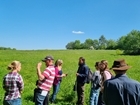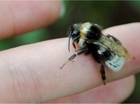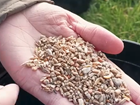Blogs
-

in:
Allerton Project Research Blog
under:
Farming
, Allerton Project
, Farmland Ecology
Politicising climate change is dangerous. There are numerous examples of how forcing complex environmental issues into binary choices doesn’t turn out well. Understanding the science, accepting the complexity, and acting on the best evidence available at the time is the only way out of the considerable challenges we currently face.
-

in:
Farmland Ecology Blog
under:
Farming
, Farmland Ecology
, Policy
As the BEESPOKE project draws to a close, there are a number of crucial messages to take away. Pollinators, like many living creatures, need food, shelter and somewhere to nest. The need for floral diversity to provide pollinators with food sources that suit them is a key point around which the BEESPOKE project was largely based.
-

in:
Allerton Project Research Blog
under:
Allerton Project
, Farming
, Farmland Ecology
Chapter 6 of Farming with the Environment covers the aquatic side of things. Some of it is about how nutrients behave in water and how aquatic invertebrate communities are affected by them. But the fact is that what goes on in water is influenced massively by the management of the land draining into it.
-

in:
Allerton Project Research Blog
under:
Allerton Project
, Farming
, Farmland Ecology
Nationally and globally, the abundance and species diversity of wildlife has declined over the past decades. In Farming with the Environment, I describe the steps we have taken to reverse this decline through the development of practical evidence-based habitat creation and management.
-

-

-

-

in:
GWCT News Blog
under:
Advice
, Farmland Ecology
, Farming
Supplementary feeding has become a widespread management tool for declining farmland birds. In the countryside in late winter there is often not enough natural seed food, which causes a hungry gap between February and April when lots of birds die of starvation.
-

in:
GWCT News Blog
under:
Allerton Project
, Farming
, Farmland Ecology
The GWCT Allerton Project is looking for ten wheat farmers in the Nestlé/Purina supply chain in the East (Norfolk, Suffolk, Cambridgeshire and Northants) to work together to baseline, trial, train, benchmark, network and innovate their way towards net zero.
-

in:
Farmland Ecology Blog
under:
Farmland Ecology
, Farming
This February and March the Farmland Ecology Unit collected 1,200 soil samples as part of the healthy soil, healthy food, and healthy people (H3) project. H3 is part of a large interdisciplinary project aiming to transform UK food systems by putting the health of people and the environment at the forefront of UK food production.
Get the Latest News & Advice
Join over 100,000 subscribers and stay updated on our latest advice, research, news and offers.
*You may change your mind any time. For more information, see our Privacy Policy.